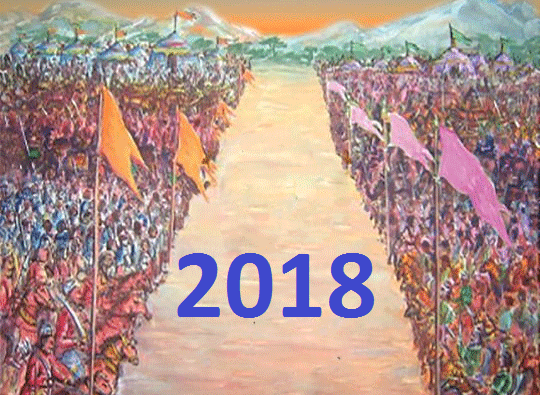
Problem Solving and Decision Making in 2018 : Lessons from the Bhagavad Gita
This post is also available in:
![]() Hindi
Hindi ![]() Marathi
Marathi
2018 New Year Discourse by Sirshree
As we welcome the 18th year of the millennium, the number 18 takes on a special significance. The number 18 has a special significance in various traditions and religions as well. For example, the Jews give donations in multiples of 18. In China, the number 18 considered a very auspicious number and is associated with success and prosperity.
Closer home in India, The Bhagavad Gita contains 18 chapters. The Gita itself is a part of the Mahabharata, which has 18 books that tells the story of a war that lasted for 18 days between 18 armies. While the Gita is a great primer on spirituality and the paths to realization, it also offers several key lessons in day-to-day life – especially in the areas of problem solving and decision-making. After all the context of the Gita is the decision Arujun had to make to go to war or not while solving the problem he and his brothers were in. Let us therefore look at five key lessons from the Gita in the areas of problem solving and decision-making as we augur in 2018:
- “Winning for the real purpose of playing” instead of “Playing to win”: We have all heard about playing to win. It is better than living a life where we are playing to lose. The secret of Karma that the Gita teaches, which is often not understood deeply is that playing, in itself, is winning. Most of us have heard that the Gita teaches us to renounce the fruit of action. What it actually entails is that we ought to play the game of life by revelling in the game, rather than bothering about its consequences.
A mother tells a child, “Go out there and play. I will reward you with a chocolate.” The mother needs to understand that the child doesn’t need any other reward. Playing itself is the reward. This is like starting a race at the finishing line! There is no stress about competition or winning. Running itself is .
Similarly, when you are solving problems or making decisions, understand that there is no need for any further reward; being able to express one’s qualities through the opportunity of problem solving and decision-making itself is the reward. An author who writes to enjoy the process of writing can write with the understanding that writing itself is the reward, more than what comes with the publishing or propagation of his written work.
Playing is very much winning. So, in 2018, bring this attitude in problem solving and decision-making and experience the possibility that the consequence of your actions could be the action itself.
- Go to war against your Internal demons instead of external situations: The Gita is made out to be a situation where Arjuna is seeking advice on how he could go to war against his own relatives. The deeper secret is that the relatives are symbolic. They signify our internal demons. Lord Krishna exhorts Arjuna in the Gita that there is nothing more welcome to a warrior than a righteous war.
The deeper message in this that a spiritual warrior is one who wages an inner war against his own demons, against desires that keep returning back to entrap him, against his own tendencies that lead him away from his true nature. Our senses constantly demand our attention. A spiritual warrior fights his or her own inclination towards sensory pleasures – all while being detached.
In much the same way, problem solving and decision-making has been made out to be one where you constantly are fighting external factors including competition, changing environment, etc. However, in 2018, be inspired by the 18 chapters of the Gita and attempt to vanquish your internal demons first and your external problems will be solved as well.
- Listen deeply instead of jumping to conclusions: The whole first chapter of the Gita is about Arjuna sharing his woes. Called ‘Arjun Vishad Yog’, the first chapter brings out Arjuna’s despondency as he shares all the thoughts that disturb him. Krishna listens to him patiently. The teachings of the Gita begin only in the second chapter when Krishna starts to speak. The key lesson here is when you are solving problems and making decisions that involve others, listen to them deeply. Especially when you are solving others’ problems or making decisions for others, seek first to understand before offering advice.
The other message is that when you are solving your own problems, have honesty, straightforwardness and total surrender to God like Arjuna. If you truly listen to your feelings and surrender to God fully, even a state of despondency attains the character of yoga.
In 2018, Instead of jumping to ideas, conclusions and advice, practice first staying with the problem by listening deeply to your feelings and further surrender them to God.
- Clearly seeing instead of blind living: The Gita has several lessons about the importance of clearly seeing instead of blindly acting out of compulsion. The Gita itself is a divine song where Sanjaya is seeing what is happening in the battlefield through his divine sight detachedly without bias and is communicating to the blind King.
Clear seeing essentially requires us to realize our true nature beyond thoughts. When we are unable to see clearly, we tend to be driven by our thoughts that arise as impulsive reaction in situations. We need to raise our awareness towards the working of the mind so as to bring its exploits to light and respond from the standpoint of higher awareness. One powerful way of raising our awareness is to ask key questions to ourselves when we find the mind drifting away.
Clear seeing enables us to also dissolve problem situations. Seeing the situation as a problem is the only problem. When we look at situations through the lens of our beliefs, we build resistance. Resistance causes the problem to persist. Problems that occur at a given level of awareness can never be resolved at the same level of awareness. We need to raise our awareness to be able to witness clearly. With clear seeing from a higher awareness, the problem no longer remains a problem.
In 2018, practice clear seeing when you are solving problems and making decisions. The most important thing to clearly see is that you are a part of the problem too. Question yourself from time to time about your motives and your perceptions, so as to bring biases, prejudices and limitations to light. Clear seeing dissolves our faulty perceptions and transforms our lives from blind living to awakened living.
- Decide from the centre instead of deciding abruptly or impulsively: As the Mahabharata indicates, Arjuna was filled with deep sorrow on seeing all his elders, teachers, cousins, friends and relatives in the enemy camp. But despite his sad state, Arjuna asks Krishna to take him to the centre of the battlefield. He receives guidance from Krishna at the very centre. Arjuna could have sought the solution without moving to the centre of the battlefield. After all Krishna was his charioteer and all Arjuna had to do was to seek simply ask Krishna for guidance wherever he was. Perhaps, Arjuna knew that divine guidance cannot be received without reaching the centre – our hearts (tejasthan).
We receive guidance only when we reach our centre. In times of stress, we move away from the centre. In fact is it is precisely during moments of stress that we should shift to our centre. Arjuna was relieved of his stress only after he came to the centre. To imbibe the habit of taking decisions and solving problems from the centre, you may practice the 4-8-18 technique.
The idea behind the 4-8-18 technique is that depending on the nature of the problem, you will either meditate for 4 minutes or 8 minutes of 18 minutes. For small problems, 4 minutes is enough. For serious problems and key decisions, you may consider 18 minutes. For things in between, 8 minutes is suggested. During this time, practice any meditation, especially those that lead you to a no-mind state. That is when you are in touch with your own centre. Once this time has passed, you may then take the decision practicing clear seeing – as elucidated above by also seeing yourself as the part of the problem.
The numbers 4, 8 and 18 are suggested so that you take the habit of detaching from the problem seriously. Instead of merely saying, meditate for 5 minutes, the 4-8-18 techniques brings the discipline of deciding from the centre.
In 2018, practice problem solving and decision making from the centre instead of looking at a things from just the periphery.
~Sirshree


















Add comment